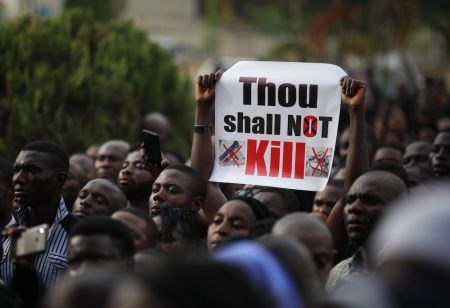Islamic State says jihadis killed 2 in attack on Nigerian church

The Islamic State has reportedly claimed responsibility for an attack on a Nigerian church during worship service that killed two guards and injured three members.
The terror group claimed the Oct. 16 attack on the Celestial Church of God in the Felele area of Lokoja on behalf of the Islamic State West Africa Province on Instagram last week, according to United States-based news agency Sahara Reporters. The report states that the attackers used automatic weapons.
"After killing the two guards, the congregants dispersed immediately," the social media statement was quoted as reading. The statement didn't disclose if the attackers entered the church.
The terror group's statement also boasted that the Islamic State carried out 15 "successful" attacks in Kogi state alone in 2022.
Sources told The Daily Trust in October that perpetrators invaded the church at about 8 p.m. on Oct. 16, a Sunday evening. The gunmen shot at members inside the church.
The sources said the members injured or killed in the incident were rushed to a nearby medical center.
The attack marked the second time that a church was reportedly attacked in the Lokoja area within weeks.
The Daily Trust reported that another church in the Fedele area occurred a few weeks beforehand. A local police information officer told the outlet that "two female members of the church were killed in the attack, while others are receiving treatment for gun wounds."
The rise of Islamic extremism in Nigeria in the last decade-plus has caused millions to flee their homes and thousands of deaths.
The United Nations estimates that there are over 3.1 million internally displaced persons in Nigeria as of June 2022, fleeing insurgency and other forms of violence.
While ISWAP presents a significant threat across the northeast, factions of Boko Haram and the al-Qaeda affiliate Ansaru also operate in some regions.
These groups target non-Muslim communities and Muslims who disagree with or oppose their interpretation of Islamic practice and tradition. The Council of Foreign Religions reports that the violence by Islamic extremist groups has been primarily contained in the Muslim north, especially Borno state.
In the last year, a handful of attacks have targeted churches in central or southern Nigeria.
Last June, around 40 people were killed and dozens injured in a bomb-and-gun attack at St. Francis Xavier Catholic Church in Owo on Pentecost Sunday.
Bishop Jude Arogundade of the Roman Catholic Diocese of Ondo in southwestern Nigeria spoke with The Christian Post and said that the massacre "left the entire community broken" and the "entire diocese shattered."
Last September, the U.S. Commission on International Religious Freedom warned that religious freedom is deteriorating in Nigeria because of rising violence by non-state actors and that "poor governance" was driving and aggravating that violence.
"In recent years, nonstate actor violence has increased in most parts of Nigeria, and this violence has yielded devastating humanitarian and human rights consequences, including but not limited to violence based on religion and other violations of Nigerians' rights to freedom of religion or belief," USCIRF stated in a report on violence in Africa's most populous country.
"Violence that infringes on freedom of religion or belief in Nigeria includes militant Islamist violence, identity-based violence at the intersection of religion, ethnicity, and geographic heritage, mob violence against individuals accused of blasphemy, and violence impacting worship," explained the congressionally mandated body of independent experts tasked with advising the federal government on religious freedom issues.
Militant Islamist groups, including the ISWAP, Boko Haram and Ansaru, have political and ideological objectives, including overthrowing secular governance and enforcing a particular interpretation of Islam, USCIRF reports.
Many have raised concerns about what they perceive as the government's inaction in holding terrorists accountable for the rising murders and kidnappings, which some groups warn have reached the level of genocide.





















